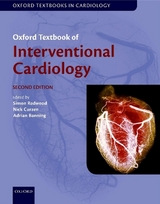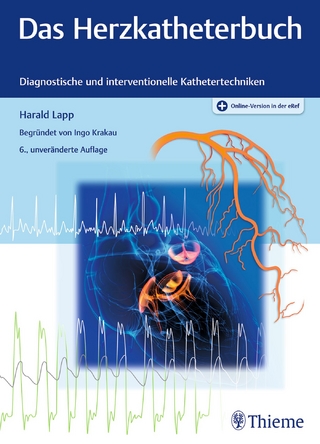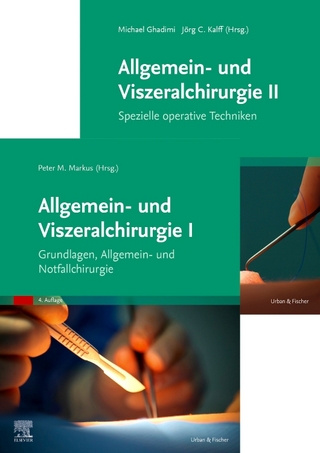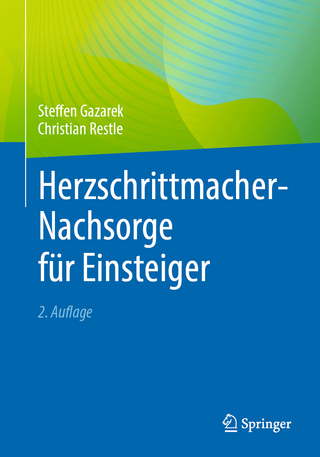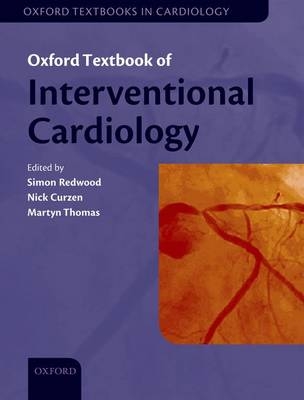
Oxford Textbook of Interventional Cardiology
Oxford University Press (Verlag)
978-0-19-956908-3 (ISBN)
- Titel ist leider vergriffen;
keine Neuauflage - Artikel merken
Cardiac catheterization and coronary angiography remain the key tools in the management of patients with coronary heart disease. Interventional cardiology is now routinely performed outside of major cardiac centres, often in small district hospitals. General training in cardiology rarely offers more than the opportunity to assist a more senior operator to perform angioplasty procedures, so a textbook for the non-specialist has become essential reading. Oxford Textbook of Interventional Cardiology is a definitive text spanning the whole spectrum of interventional cardiology procedures, including management of patients with coronary artery disease, one of the leading killers in western society. Written by an expert faculty of international authors, it offers guidance on all aspects of interventional cardiology according to the European curriculum and guidelines for practice, and covers the very latest techniques and devices to provide practical, evidence-based guidance on treating a full range of coronary lesions.
The book also covers structural heart disease and new developments in heart valve disease, which were previously in the realm of cardiac surgeons but are now being treated by cardiologists using less invasive methods.
Simon Redwood trained in cardiology at The Royal London Hospital, The Royal Free Hospital and St. George's Hospital, London. Interventional training was obtained at The Washington Cardiology Center, Washington, DC and Guy's and St. Thomas' Hospitals. He obtained Fellowship of the American College of Cardiology in 2001 and became a Fellow of the Royal College of Physicians in 2003 and Fellow of the Society of Angiography and Interventions in 2004. Dr Redwood is Reader/ Consultant Interventional Cardiologist and Director of the Cardiac Catheter labs at St. Thomas', one of the highest volume catheter lab suites in the UK. He is also a Council Member and Treasurer of the British Cardiovascular Intervention Society. He is trained in all aspects of adult interventional cardiology including intravascular ultrasound, physiological lesion assessment using pressure-sensor tipped wires, stent implantation, rotational atherectomy, and laser angioplasty including the laserwire for chronic total occlusions. Nick Curzen is a consultant cardiologist with a special interest in coronary intervention at Southampton University Hospitals NHS Trust and Honorary Senior Lecturer at Southampton University Medical School. He qualified from Southampton with Honours in 1987 and obtained MRCP in 1990. In 1996 he was awarded his PhD from Imperial College, London, for a thesis involving vascular pharmacology and molecular biology. His clinical training was at Southampton University, Royal Bournemouth, Royal Brompton, London Chest and St Bartholomews hospitals. He became a consultant interventional cardiologist at Manchester Royal Infirmary in 1999 and moved to Wessex Cardiothoracic Centre, Southampton in January 2004. Martyn Thomas trained in interventional cardiology at Kings College Hospital, London. He was a consultant and clinical director of cardiac services at Kings College Hospital from 1996 to 2007, President of the British Cardiovascular Intervention Society from 2004 to 2008, and has been Director of Cardiothoracic Services at Guys and St Thomas' NHS Foundation trust since 2007.
BACKGROUND AND BASICS; 1. The epidemiology and pathophysiology of coronary artery disease; 2. The history of interventional cardiology; 3. Risk assessment and analysis of outcomes; 4. Vascular access: femoral versus radial; 5. Radiation and percutaneous coronary intervention; 6. The 'golden rules' of percutaneous coronary intervention; 7. Routine management after percutaneous coronary intervention; PERCUTANEOUS CORONARY INTERVENTION-RELATED IMAGING; 8. Angiography: indications and limitations; 9. Coronary physiology in clinical practice; 10. The role of intravascular ultrasound in percutaneous coronary intervention; 11. Virtual histology intravascular ultrasound and optical coherence tomography in percutaneous coronary intervention; 12. Coronary computed tomography for the interventionalist; 13. Cardiovascular magnetic resonance; PERCUTANEOUS CORONARY INTERVENTION BY CLINICAL SYNDROME; 14. Stable coronary artery disease: medical therapy versus percutaneous coronary intervention versus surgery; 15. Percutaneous coronary intervention in non-ST elevation acute coronary syndrome; 16. Primary percutaneous coronary intervention for ST elevation myocardial infarction; 17. Percutaneous coronary intervention in patients with impaired left ventricular function; PERCUTANEOUS CORONARY INTERVENTION BY LESION AND PATIENT SUBSETS; 18. Coronary bifurcation stenting: state of the art; 19. Percutaneous coronary intervention for unprotected and protected left main stem disease; 20. Chronic total occlusions; 21. Revascularization in diabetes mellitus; ADJUNCTIVE THERAPIES IN PERCUTANEOUS CORONARY INTERVENTION; 22. Current status of oral antiplatelet therapies; 23. Current status of glycoprotein IIb/IIIa inhibitors; 24. The contemporary use of antiplatelet therapy in interventional cardiology; 25. The role of bivalirudin in percutaneous coronary intervention; 26. Optimal medical therapy in percutaneous coronary intervention patients: statins and ACE inhibitors as disease-modifying agents; COMPLICATIONS OF PERCUTANEOUS CORONARY INTERVENTION; 27. Contrast-induced acute kidney injury; 28. In-stent restenosis in the drug-eluting stent era; 29. Stent thrombosis; 30. Stent loss and retrieval; 31. No-reflow; 32. Coronary artery perforation; SPECIAL DEVICES IN PERCUTANEOUS CORONARY INTERVENTION; 33. Rotational atherectomy; 34. Laser; 35. Cutting balloons and AngioSculpt; 36. Thrombus extraction in the contemporary management of ST-segment elevation myocardial infarction; 37. Distal protection; NON-CORONARY PERCUTANEOUS INTERVENTIONS; 38. Percutaneous device closure of atrial septal defect and patent foramen ovale; 39. Transcatheter aortic valve replacement; 40. Mitral balloon valvuloplasty; 41. Alcohol septal ablation for obstructive hypertrophic cardiomyopathy; 42. Carotid artery stenting
| Reihe/Serie | Oxford Textbooks in Cardiology |
|---|---|
| Zusatzinfo | 321 black and white illustrations and 172 colour illustrations |
| Verlagsort | Oxford |
| Sprache | englisch |
| Maße | 197 x 250 mm |
| Gewicht | 1799 g |
| Themenwelt | Medizinische Fachgebiete ► Chirurgie ► Herz- / Thorax- / Gefäßchirurgie |
| Medizinische Fachgebiete ► Innere Medizin ► Kardiologie / Angiologie | |
| ISBN-10 | 0-19-956908-8 / 0199569088 |
| ISBN-13 | 978-0-19-956908-3 / 9780199569083 |
| Zustand | Neuware |
| Informationen gemäß Produktsicherheitsverordnung (GPSR) | |
| Haben Sie eine Frage zum Produkt? |
aus dem Bereich
